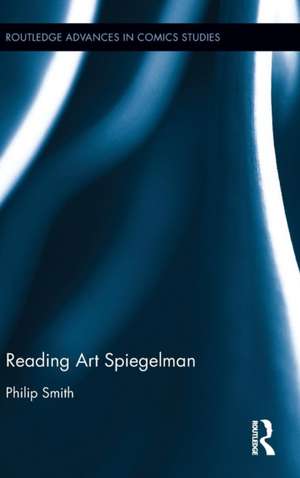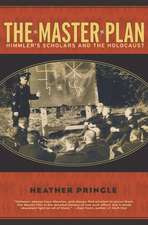Reading Art Spiegelman: Routledge Advances in Comics Studies
Autor Philip Smithen Limba Engleză Hardback – 10 dec 2015
| Toate formatele și edițiile | Preț | Express |
|---|---|---|
| Paperback (1) | 442.50 lei 6-8 săpt. | |
| Taylor & Francis – 3 ian 2018 | 442.50 lei 6-8 săpt. | |
| Hardback (1) | 1058.69 lei 6-8 săpt. | |
| Taylor & Francis – 10 dec 2015 | 1058.69 lei 6-8 săpt. |
Din seria Routledge Advances in Comics Studies
-
 Preț: 274.88 lei
Preț: 274.88 lei -
 Preț: 311.85 lei
Preț: 311.85 lei -
 Preț: 442.50 lei
Preț: 442.50 lei -
 Preț: 368.22 lei
Preț: 368.22 lei -
 Preț: 378.06 lei
Preț: 378.06 lei - 17%
 Preț: 253.67 lei
Preț: 253.67 lei -
 Preț: 368.63 lei
Preț: 368.63 lei - 17%
 Preț: 259.72 lei
Preț: 259.72 lei - 18%
 Preț: 1002.63 lei
Preț: 1002.63 lei -
 Preț: 369.78 lei
Preț: 369.78 lei -
 Preț: 369.19 lei
Preț: 369.19 lei -
 Preț: 422.59 lei
Preț: 422.59 lei - 21%
 Preț: 258.63 lei
Preț: 258.63 lei -
 Preț: 373.87 lei
Preț: 373.87 lei - 17%
 Preț: 257.32 lei
Preț: 257.32 lei -
 Preț: 392.93 lei
Preț: 392.93 lei - 18%
 Preț: 1003.99 lei
Preț: 1003.99 lei - 18%
 Preț: 1004.72 lei
Preț: 1004.72 lei -
 Preț: 373.07 lei
Preț: 373.07 lei -
 Preț: 378.96 lei
Preț: 378.96 lei
Preț: 1058.69 lei
Preț vechi: 1291.09 lei
-18% Nou
Puncte Express: 1588
Preț estimativ în valută:
202.57€ • 211.51$ • 167.66£
202.57€ • 211.51$ • 167.66£
Carte tipărită la comandă
Livrare economică 04-18 aprilie
Preluare comenzi: 021 569.72.76
Specificații
ISBN-13: 9781138956766
ISBN-10: 1138956767
Pagini: 160
Dimensiuni: 152 x 229 x 20 mm
Greutate: 0.57 kg
Ediția:1
Editura: Taylor & Francis
Colecția Routledge
Seria Routledge Advances in Comics Studies
Locul publicării:Oxford, United Kingdom
ISBN-10: 1138956767
Pagini: 160
Dimensiuni: 152 x 229 x 20 mm
Greutate: 0.57 kg
Ediția:1
Editura: Taylor & Francis
Colecția Routledge
Seria Routledge Advances in Comics Studies
Locul publicării:Oxford, United Kingdom
Public țintă
Postgraduate and UndergraduateCuprins
Introduction 1. Formal Experimentation and Emotional Breakdowns 2. Historiography and Survival in Maus 3. The Story of a Story: In the Shadow of No Towers Conclusion: Divinest Sense
Recenzii
"The work of Art Spiegelman is one of the great sources of academic and literary legitimacy for the study of comics/graphic novels. Phillip Smith’s book not only thoroughly documents this contribution but it brilliantly analyses its roots in underground comics (Breakdowns), the evolution of his masterwork Maus, and the continued development of the artist into In the Shadow of No Towers. This is a volume that every scholar of comics/graphic novels will want to add to her library." --Daniel J. O’Rourke, Ashland University, USA
"Smith makes an important contribution to comics writing with this work. History’s recent horrors are easily understood in terms of pure barbarism, yet such an explanation is unsatisfying. Inhumanity towards others often cloaks itself in the veneer of rationality. Smith makes a compelling case that Spiegelman’s work strips away that veneer by making us confront the madness of our complicity." –Bond Benton, SUNY Fredonia, USA
"[A] commendable [...] tome that contributes to our understanding of Spiegelman as well as madness, trauma, and Holocaust studies." --Lim Cheng Tju, International Journal of Comic Art
"Smith makes an important contribution to comics writing with this work. History’s recent horrors are easily understood in terms of pure barbarism, yet such an explanation is unsatisfying. Inhumanity towards others often cloaks itself in the veneer of rationality. Smith makes a compelling case that Spiegelman’s work strips away that veneer by making us confront the madness of our complicity." –Bond Benton, SUNY Fredonia, USA
"[A] commendable [...] tome that contributes to our understanding of Spiegelman as well as madness, trauma, and Holocaust studies." --Lim Cheng Tju, International Journal of Comic Art
Descriere
The central thesis of this book is that Art Spiegelman’s comics all identify deeply-rooted madness in post-Enlightenment society. Spiegelman maintains, in other words, that the Holocaust was not an aberration, but an inevitable consequence of modernisation. In service of this argument, Smith offers a reading of Spiegelman’s comics, with a particular focus on his three main collections: Breakdowns (1977 and 2008), Maus (1980 and 1991), and In the Shadow of No Towers (2004). He draws upon a taxonomy of terms from comic book scholarship, attempts to theorize madness (including literary portrayals of trauma), and critical works on Holocaust literature.












